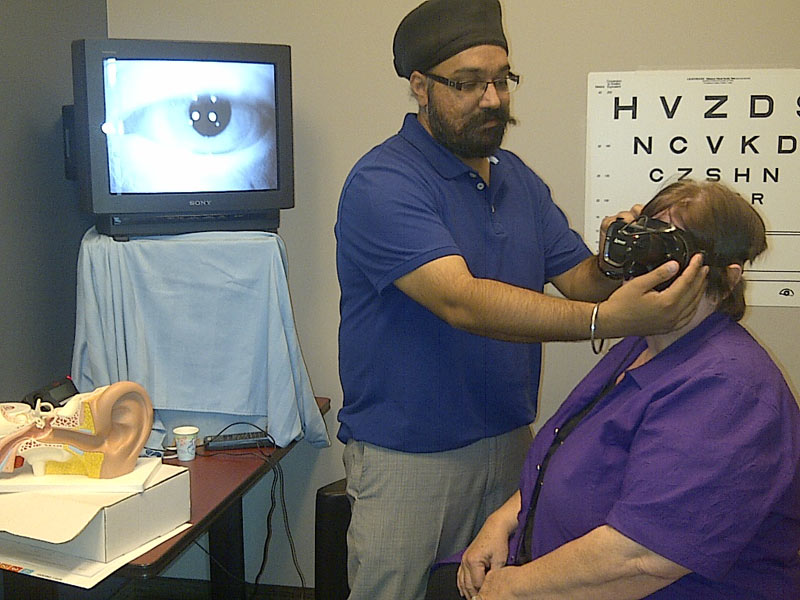
Do you suffer from dizziness? Does the room spin when you roll or rise from bed? Do you feel lightheaded or off balance when you move quickly? Are you worried about falling? If you feel any of these symptoms you might be a candidate for Vestibular Rehabilitation; a program run by Dr. Harpeet Singh of LifeMark Physiotherapy Chestermere.
This LifeMark Physiotherapy is the only physiotherapy clinic to offer this program to Chestermere, Langdon, Strathmore, and the surrounding area.
Who benefits from Vestibular Rehabilitation? People with balance problems, dizziness & vertigo, motion sensitivity, and inner ear, brain or neck-related symptoms.
Assessment includes – a detailed evaluation of the vestibular and balance system, nystagmus analysis using an infrared camera in black-out goggles, assessments of fall risk, and education on dizziness/balance problems.
Treatments may include – repositioning maneuvers for Benign Paroxysmal Positional Vertigo, techniques to promote adaptation or substitution for vestibular dysfunction, balance retraining and fall prevention, and retraining accurate perception of neck position.
Most dizziness, vertigo and balance problems come from a disturbance in the Vestibular apparatus located in the inner ear or its connections in the brain. LifeMark’s Vestibular assessment and treatments provide a proven, research-based branch of rehabilitation medicine designed to either maximize the body’s ability to compensate for these problems, or eliminate them altogether.
LifeMark is one of the few Vestibular Rehabilitation providers that use infrared video goggle analysis as part of the assessment process. The eye and inner ear are highly integrated, allowing us to use the valuable information provided by the infrared goggles to determine what the underlying cause of your dizziness might be, and which techniques or maneuvers are appropriate for your treatment.
For safety, they perform detailed neck and neurological screening prior to assessment and treatment and modify your care accordingly.
And here is a more in-depth explanation and definition for the more medically minded.
Definition:
A significant part of our equilibrium comes from the brain receiving, and accurately interpreting, information from the vestibular system. The vestibular system includes the vestibular labyrinth in the inner ear, which senses our head movement/position, the vestibular nerve from the ear to the brain, and the vestibular connections within the brain.
What can cause the problems?
Vestibular disorders can come from pathologies in any area of this complex system. They can be insidious or due to factors such as trauma (motor vehicle accidents, falls, contact sports, blows to the head), infections, aging, medications, brain-related problems, or secondary to other diseases or injuries. Symptoms can include dizziness, imbalance, blurry vision, motion sensitivity, nausea, poor concentration, muscle guarding/restriction of movement, decreased activity levels or social interaction, anxiety and depression.
What is Vestibular Rehabilitation?
Vestibular Rehabilitation is a proven, research-based branch of physiotherapy where specific individualized techniques are used to maximize the brain’s compensation for vestibular pathology, or where maneuvers are done, to correct mechanical dysfunctions in the vestibular apparatus.
What can a client expect during assessment and treatment?
LifeMark’s vestibular assessment is extensive and includes infrared video-analysis of eye movements, which provides information about the inner ear and its connections in the brain. Treatment can involve a combination of static and dynamic balance retraining, gaze stabilization, training for motion sensitivity, and canalith repositioning maneuvers: the results are often dramatic. The balance retraining component is also effective for clients who don’t necessarily have a vestibular problem, but have orthopaedic or central disorders, proprioceptive problems, or vision changes affecting their equilibrium. LifeMark is actively involved in research, and is committed to utilizing the most current evidence-based tests and techniques in its training and treatment programs.
Symptoms that can be treated with Vestibular Rehabilitation
Vertigo, dizziness, motion sensitivity, unsteadiness, falls, nausea or vomiting, blurry or bouncy vision, light-headedness, and post concussion related symptoms.









